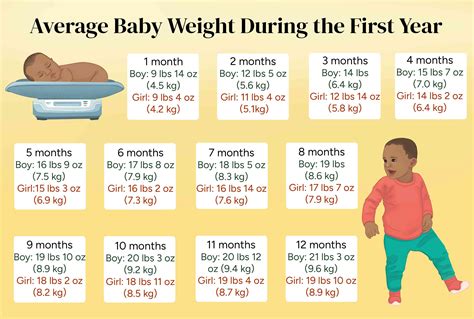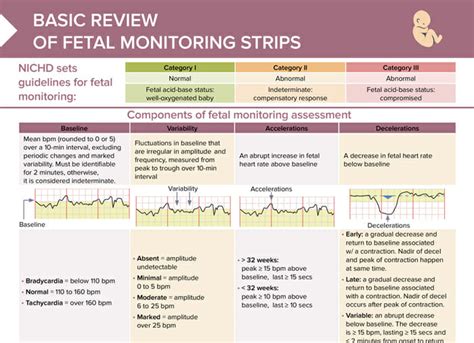Intro
Discover average infant weight at birth, including low birth weight, newborn development, and healthy baby growth, to ensure optimal care for your little one.
The average infant weight at birth is a topic of great interest to expecting parents, healthcare professionals, and researchers alike. Understanding the average weight of newborns is essential for monitoring fetal growth and development during pregnancy, as well as for identifying potential health issues early on. Babies who are significantly underweight or overweight may be at a higher risk for certain health problems, making it crucial to track and analyze birth weights. In this article, we will delve into the factors that influence infant weight at birth, the benefits of monitoring fetal growth, and the potential risks associated with abnormal birth weights.
The importance of monitoring fetal growth and development cannot be overstated. By tracking the weight and size of the fetus during pregnancy, healthcare providers can identify potential issues and take proactive steps to ensure the best possible outcome for both mother and baby. Factors such as maternal nutrition, lifestyle, and overall health can all impact fetal growth, making it essential to maintain a healthy pregnancy. Additionally, understanding the average infant weight at birth can help parents prepare for the arrival of their baby, making informed decisions about feeding, care, and nurturing.
The average infant weight at birth varies depending on several factors, including gestational age, sex, and ethnicity. Generally, a newborn baby weighs between 5.5 and 8.8 pounds (2.5 to 4 kilograms), with the average weight being around 7.9 pounds (3.6 kilograms). However, it's essential to note that these numbers can vary significantly, and what is considered a "normal" birth weight can differ from one population to another. For instance, babies born to mothers of Asian descent tend to be slightly smaller than those born to mothers of European or African descent.
Average Infant Weight At Birth: Factors That Influence

Several factors can influence the average infant weight at birth, including maternal nutrition, lifestyle, and overall health. A well-balanced diet rich in essential nutrients, such as folic acid, iron, and calcium, is crucial for supporting fetal growth and development. Additionally, factors such as maternal age, parity (number of previous births), and gestational age can all impact birth weight. For example, babies born to older mothers or those who have had multiple previous births may be at a higher risk for being underweight or overweight.
Maternal Nutrition and Lifestyle
A mother's diet and lifestyle during pregnancy can significantly impact fetal growth and development. A diet rich in essential nutrients, such as protein, healthy fats, and complex carbohydrates, can support the growth and development of the fetus. Additionally, regular exercise and a healthy weight can also contribute to a healthy pregnancy and optimal birth weight. On the other hand, a diet high in processed foods, sugar, and unhealthy fats can increase the risk of excessive weight gain and other health problems.Benefits of Monitoring Fetal Growth

Monitoring fetal growth and development during pregnancy has numerous benefits, including early detection of potential health issues and improved pregnancy outcomes. By tracking the weight and size of the fetus, healthcare providers can identify babies who may be at risk for growth restriction or other health problems. This information can be used to develop a personalized care plan, ensuring the best possible outcome for both mother and baby. Additionally, monitoring fetal growth can help identify babies who may be at risk for being underweight or overweight, allowing for early intervention and support.
Potential Risks Associated with Abnormal Birth Weights
Babies who are significantly underweight or overweight may be at a higher risk for certain health problems, including respiratory distress, hypoglycemia, and increased risk of infection. Low birth weight babies (less than 5.5 pounds) may require additional medical care and support, including oxygen therapy, temperature regulation, and nutritional support. On the other hand, babies who are overweight (more than 8.8 pounds) may be at a higher risk for birth injuries, respiratory problems, and metabolic disorders later in life.Tracking Fetal Growth and Development
Tracking fetal growth and development during pregnancy involves a combination of ultrasound scans, maternal weight gain, and fetal movement monitoring. Ultrasound scans can provide valuable information about fetal size, weight, and development, while maternal weight gain can indicate whether the fetus is growing at a healthy rate. Fetal movement monitoring, such as kick counts, can also provide insight into fetal well-being and detect potential issues early on.
Ultrasound Scans and Fetal Measurement
Ultrasound scans are a crucial tool for tracking fetal growth and development during pregnancy. By measuring the size and weight of the fetus, healthcare providers can estimate gestational age, detect potential growth restriction, and identify other health issues. Fetal measurement can include parameters such as head circumference, abdominal circumference, and femur length, providing a comprehensive picture of fetal growth and development.Promoting Healthy Fetal Growth and Development

Promoting healthy fetal growth and development requires a combination of good nutrition, regular exercise, and overall health and wellness. A well-balanced diet rich in essential nutrients, such as folic acid, iron, and calcium, can support fetal growth and development. Regular exercise, such as walking or prenatal yoga, can also contribute to a healthy pregnancy and optimal birth weight. Additionally, avoiding harmful substances, such as tobacco and alcohol, and managing stress can also promote healthy fetal growth and development.
Managing Stress and Anxiety During Pregnancy
Managing stress and anxiety during pregnancy is crucial for promoting healthy fetal growth and development. High levels of stress and anxiety can increase the risk of preterm labor, low birth weight, and other health problems. Engaging in stress-reducing activities, such as meditation, deep breathing, or prenatal massage, can help manage stress and promote overall well-being. Additionally, building a support network of family, friends, and healthcare providers can also provide emotional support and reassurance during pregnancy.Conclusion and Next Steps

In conclusion, understanding the average infant weight at birth is essential for monitoring fetal growth and development during pregnancy. By tracking the weight and size of the fetus, healthcare providers can identify potential health issues and develop a personalized care plan to ensure the best possible outcome for both mother and baby. Promoting healthy fetal growth and development requires a combination of good nutrition, regular exercise, and overall health and wellness. By taking proactive steps to support fetal growth and development, parents can help give their baby the best possible start in life.
We invite you to share your thoughts and experiences on this topic. Have you had a baby with a low or high birth weight? What steps did you take to support fetal growth and development during pregnancy? Share your story in the comments below, and let's work together to promote healthy fetal growth and development.
What is the average infant weight at birth?
+The average infant weight at birth is around 7.9 pounds (3.6 kilograms), but can vary depending on several factors, including gestational age, sex, and ethnicity.
What factors can influence infant weight at birth?
+Several factors can influence infant weight at birth, including maternal nutrition, lifestyle, and overall health, as well as gestational age, parity, and ethnicity.
How can I promote healthy fetal growth and development during pregnancy?
+Promoting healthy fetal growth and development requires a combination of good nutrition, regular exercise, and overall health and wellness. A well-balanced diet rich in essential nutrients, regular exercise, and avoiding harmful substances can all support fetal growth and development.
What are the potential risks associated with abnormal birth weights?
+Babies who are significantly underweight or overweight may be at a higher risk for certain health problems, including respiratory distress, hypoglycemia, and increased risk of infection.
How can I track fetal growth and development during pregnancy?
+Tracking fetal growth and development during pregnancy involves a combination of ultrasound scans, maternal weight gain, and fetal movement monitoring. Regular prenatal check-ups and ultrasounds can provide valuable information about fetal size, weight, and development.
